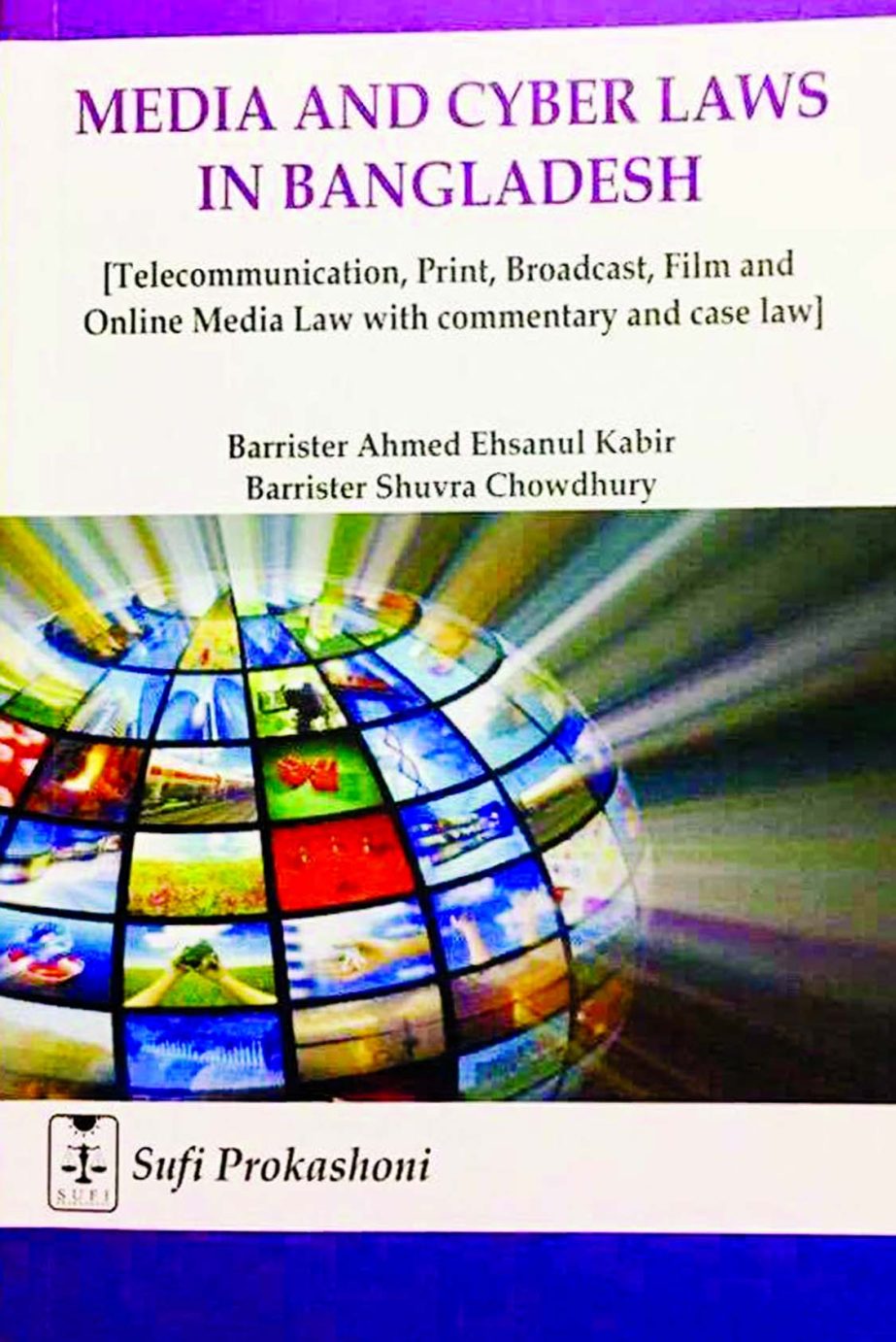
Mehnaz Abantee Huda :
The media law in Bangladesh originated during the British Colonial period. The majority of the laws and regulations that account for regulating press and media were enacted during the British era. The laws and regulations used by the British Rulers and the subsequent governments as tools to regulate and limit the freedom of press and media are still in force.
After independence in 1971, the Constitution of Bangladesh, adopted in 1972, guarantees freedom of speech and expression.
The rapidly changing world of new media presents the law with new challenges and the Parliament of Bangladesh has enacted many laws to deal with all the facets of media. The Parliament has also enacted Information and Communication Technology Act, 2006 to regulate the cyberspace.
An understanding of the Media and Cyber law is essential for anyone working in the media whether a journalist, editor or producer. Media law lawyers and students must be aware of the legal principles that relate specifically to print, broadcast, films and online mass media. It is virtually impossible to present the daily news without reference to event in the law courts or the rules of legal procedure. The book essentially offers two perspectives. The major legal principles as enshrined in the statutes are stated together with a number of pertinent quotations from leading cases. This book is divided into ten chapters. Chapter I deals with the definition of media, forms and importance of media, brief historical development of media law, yellow journalism, media aggression, press syndicate, media and good governance. Chapter II deals with freedom of expression, constitutional guarantee of freedom of expression. Chapter III provides the laws regulating press. Chapter IV deals with the cinematograph and censorship laws in Bangladesh. Chapter V deals with laws regulating the broadcast media. Chapter VI deals with the right to privacy. Chapter VII deals with right to information under the Right to Information Act, 2009. Chapter VIII deals with information and communication technology law. Chapter IX deals with the laws relating to pornography control. Chapter X deals with telecommunication laws and policies in Bangladesh.
The book is graced by the immensely valuable forewords written by the four luminous legal personalities i.e. Advocate Fazle Rabbi Mia, MP Honourable Deputy Speaker of the Parliament, Professor Dr Mizanur Rahman, former Chairman of the National Human Rights Commission, Professor Dr M Badaruddin, Dean Faculty of Law, BUBT, and Nasreen Begum, Additional Secretary, Ministry of Law, Justice and Parliamentary Affairs, Government of Bangladesh.
The writers of the Book are Barrister Ahmed Ehsanul Kabir and Barrister Shuvra Chowdhury who have been serving as Assistant Professors in the Department of Law, Jagannath University and Stamford University Bangladesh respectively. This book can be found at Sufi Prokashoni, 151, Islamia Market, Nilkhet, Dhaka.
The media law in Bangladesh originated during the British Colonial period. The majority of the laws and regulations that account for regulating press and media were enacted during the British era. The laws and regulations used by the British Rulers and the subsequent governments as tools to regulate and limit the freedom of press and media are still in force.
After independence in 1971, the Constitution of Bangladesh, adopted in 1972, guarantees freedom of speech and expression.
The rapidly changing world of new media presents the law with new challenges and the Parliament of Bangladesh has enacted many laws to deal with all the facets of media. The Parliament has also enacted Information and Communication Technology Act, 2006 to regulate the cyberspace.
An understanding of the Media and Cyber law is essential for anyone working in the media whether a journalist, editor or producer. Media law lawyers and students must be aware of the legal principles that relate specifically to print, broadcast, films and online mass media. It is virtually impossible to present the daily news without reference to event in the law courts or the rules of legal procedure. The book essentially offers two perspectives. The major legal principles as enshrined in the statutes are stated together with a number of pertinent quotations from leading cases. This book is divided into ten chapters. Chapter I deals with the definition of media, forms and importance of media, brief historical development of media law, yellow journalism, media aggression, press syndicate, media and good governance. Chapter II deals with freedom of expression, constitutional guarantee of freedom of expression. Chapter III provides the laws regulating press. Chapter IV deals with the cinematograph and censorship laws in Bangladesh. Chapter V deals with laws regulating the broadcast media. Chapter VI deals with the right to privacy. Chapter VII deals with right to information under the Right to Information Act, 2009. Chapter VIII deals with information and communication technology law. Chapter IX deals with the laws relating to pornography control. Chapter X deals with telecommunication laws and policies in Bangladesh.
The book is graced by the immensely valuable forewords written by the four luminous legal personalities i.e. Advocate Fazle Rabbi Mia, MP Honourable Deputy Speaker of the Parliament, Professor Dr Mizanur Rahman, former Chairman of the National Human Rights Commission, Professor Dr M Badaruddin, Dean Faculty of Law, BUBT, and Nasreen Begum, Additional Secretary, Ministry of Law, Justice and Parliamentary Affairs, Government of Bangladesh.
The writers of the Book are Barrister Ahmed Ehsanul Kabir and Barrister Shuvra Chowdhury who have been serving as Assistant Professors in the Department of Law, Jagannath University and Stamford University Bangladesh respectively. This book can be found at Sufi Prokashoni, 151, Islamia Market, Nilkhet, Dhaka.

